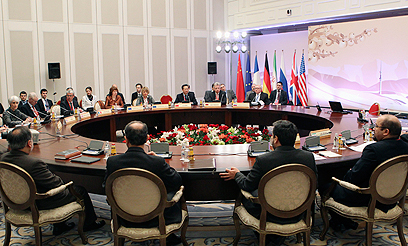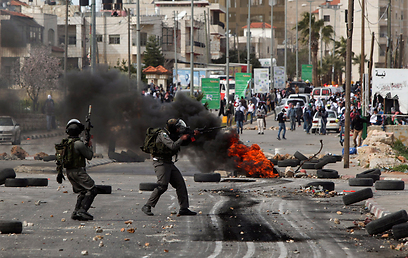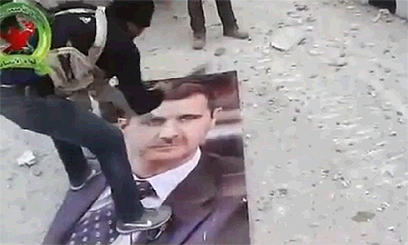
MI chief: Iran greatest threat to Israel's security
Aviv Kochavi paints grim picture of Israel's security prospects, saying Iran advancing nuke program, Palestinians near boiling point, Syria crumbling
Addressing the Iranian threat Kochavi said that "some senior Iranian officials are saying that maybe the nuclear program ought to be reconsidered due to the sanctions."
Related stories:
- Report: Iran test-fires short-range missiles
- Syria's war affects generation of children
- Palestinian killed in clashes with IDF near Hebron
Kochavi added that "the nuclear program is progressing, but Iran is making sure not to cross any internationally perceived 'red lines.' Their chief goal is to preserve the regime.
"At this time 10,000 centrifuges are at work, mainly in Qom and Natanz, enriching 240 kilos of uranium, which is enough to produce between five and six bombs, should the Iranian leader decide to make them."

Nuke talks with Iran on February (Photo: Reuters)
Kochavi further added, "Iran doesn't see a likelihood for an international attack on its nuclear facilities and will continue to promote its program. Iranian nukes are today the main threat on Israel."
Referring to the Palestinian issue Kochavi said: "We see signs from the Palestinian street that Palestinians are reaching a boiling point which stem from the economic situation, but also from the prisoners issue.

Clashes in Ramallah (Photo: EPA)
"'Price tag' activities and lack of a peace process also have an impact. Still, most of the incidents are of a limited nature, and there was no event with more than 4,000 participants. We estimate there's no energy for a third intifada."
The MI chief warned that "For the first time in dozens of years Israel has four borders threatened by terrorist breaching.
"At the same time, our enemies have institutionalized in a way which enables operational and intelligence-based responses, the neighboring countries have their own issues, and there's a meeting of interests with Sunni states."
Kochavi also commented on the Syrian civil war: "In many ways, the country is disintegrating with 60,000 killed so far, among them 50,000 civilians and 13,000 soldiers, 1.4 million refugees, mostly around Jordan
who are growing by 800 a day, and thousands of serious attacks.
 .
.
Syria. Assad lost control of most cities
"Therefore, Syria shouldn't be treated as a unified state. It should be referred to as Assad's state and the rebels' state, as two thirds of Syria's habitable areas are under rebel control.
"Most of the cities are under complete or partial rebel control. The Golan Heights is a string of enclaves in rebel or army control engaged in daily warfare with each other.
He added that "Assad is preparing to use chemical weapons." According to Kochavi, Assad "still shows
control of chemical weapons and the air force."
He pointed out that the Syrian president has started using missiles such as Scud and M600.
"He already fired 70, in addition to 600 rockets with warheads containing 300 kilos of explosives," Kochavi said.
Referring to the Arab Spring and its regional consequences, the MI chief said: "The upheaval is here to stay and will continue to simmer and affect the entire Middle East.
"The uprising's main achievement belongs to the public and its right to participate in the social process, but we see no new ideas springing up due to the upheaval."
"The forces which brought the masses in the city squares were not translated into political power. The resulting vacuum was occupied by Islamist parties, with the main movement rising up being the
Muslim Brotherhood."
Kochavi noted that "for the first time in many years the four main powers – Iran, Saudi Arabia,
Turkey and Egypt are controlled by religious leadership."
According to Kochavi, "The State of Israel is considered by them as unacceptable, so it will be increasingly difficult in the coming years to reach agreements and normalization."
Commenting on the effect of al-Qaeda and global jihad, he said: "Al-Qaeda's leader instructs his followers to move from the global to the local jihad and try to stick as much as possible to Israel's
borders."
- Receive Ynetnews updates directly to your desktop










